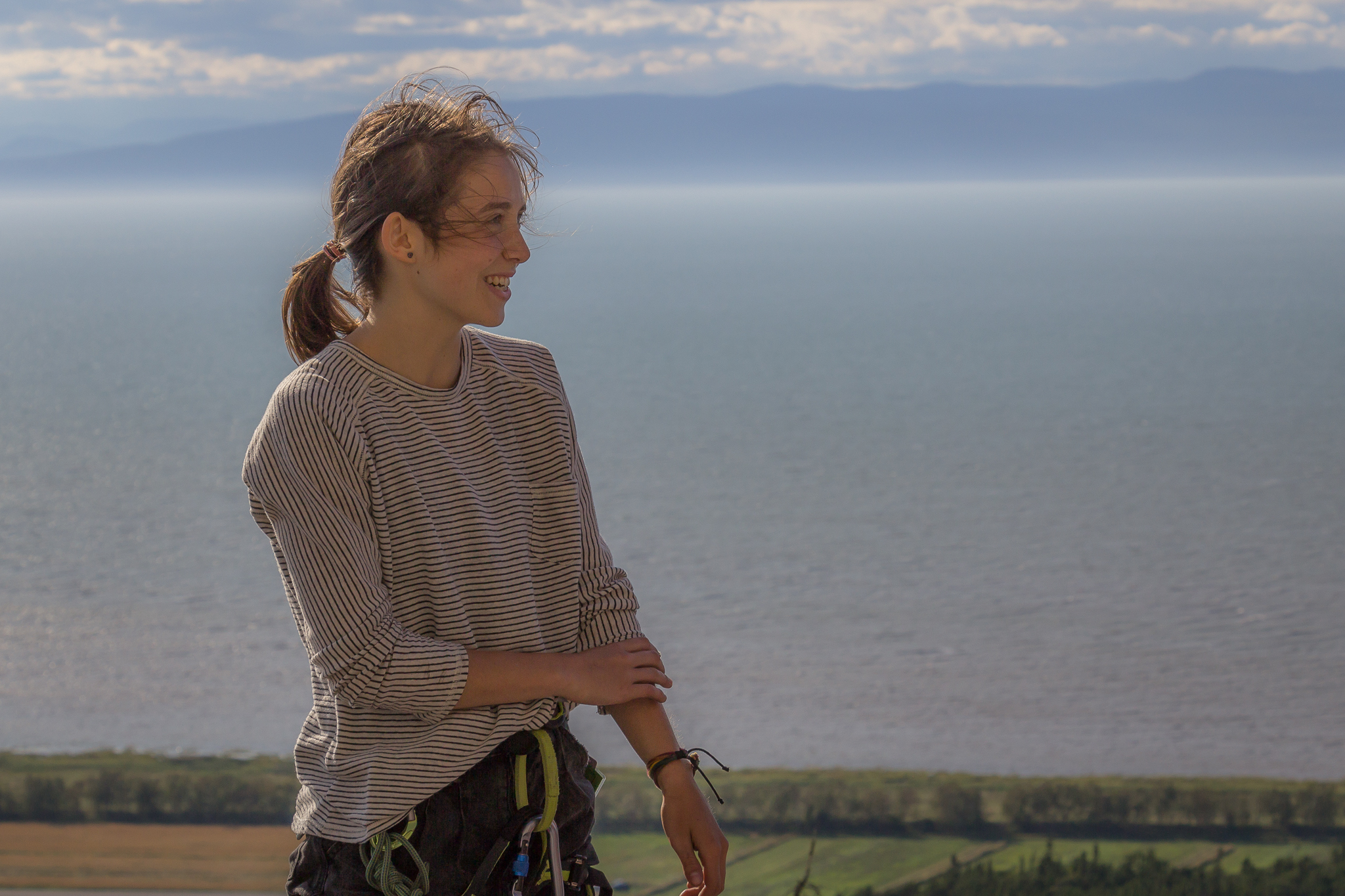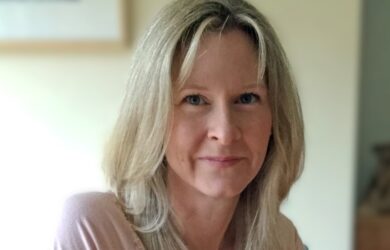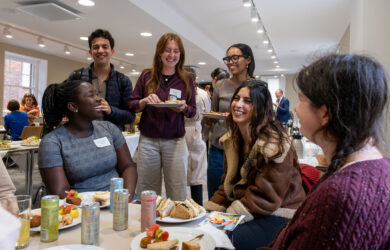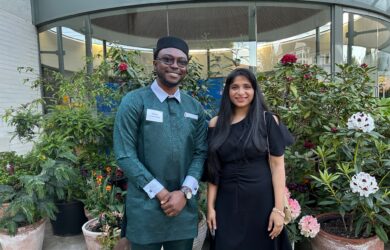
Colleen Rollins explains her work on how the brains of people with schizophrenia construct hallucinations.
As someone interested in how the brain works, hallucinations are an intriguing phenomenon. Through them it is possible to probe our perception of how we make sense of our reality.
Colleen Rollins
Colleen Rollins has long been interested in how the brain works and in mental health so it is appropriate that she is studying hallucinations in patients with schizophrenia.
“As someone interested in how the brain works, hallucinations are an intriguing phenomenon,” she says. “Through them it is possible to probe our perception of how we make sense of our reality.”
For her PhD in Psychiatry she is aiming to develop a biological model to show how the brains of people with schizophrenia construct hallucinations.
Colleen [2017] is looking at structural and functional brain scans, using software to study the different features of the brain and whether they vary in people who experience hallucinations and those who don’t.
She is particularly interested in the role of one fold or sulcus in the frontal lobe of the brain which is highly variable between individuals. Some people don’t have the fold at all, while for those who do the length of it varies. Previous research shows that the length of the fold relates to the brain’s capacity to monitor reality and distinguish between internal information and external information.
Colleen is looking at what the fold might contribute to hallucinations, studying the brains of those who experience hallucinations and using computational modelling to measure the fold in the frontal lobe. Because of its variability the fold is difficult to measure in brain scans and computer software doesn’t always recognise it is there. Colleen is thinking of working with computer scientists to address this issue.
She is also looking at the functional connectivity of the brain and how it relates to hallucinations. “I am interested in how the brain regions connect to orchestrate hallucinations. This has opened up more questions than answers, for instance, how do hallucinations relate to brain connectivity and cognitive capacities.”
An early interest in mental health
Colleen was born in Ottowa, Ontario. A curious child, who loved observing the world, doing puzzles and reading books, she was always interested in understanding how things work and human behaviour, especially abnormal variations.
Growing up she had personal experience of mental health issues it was no surprise that she developed an interest in how the mind works. An important role model was her uncle who was a prison psychologist and encouraged her throughout her studies.
At school from the age of 15 Colleen volunteered at a local mental health centre, working in a coffee kiosk where she interacted with patients and their families every day. She also spoke often to psychiatrists who worked there.
By the time she left school it was clear that she wanted to study neuroscience. Colleen enrolled at McGill University where her uncle encouraged her to get involved in research early on. In her second year she was working in a laboratory testing auditory plasticity in rats. She was awarded a research scholarship over her second summer vacation to study computational brain anatomy. Over her time at McGill she developed an interest in using computational tools to characterise and quantify alterations in brain anatomy related to different disorders of the brain.
Other research projects she was involved with included a data-led study of the higher risk of schizophrenia for those living in urban environments, a research project identifying genomic regions bound by proteins and a study using transgenic mice to look at risk factors for Alzheimer’s, such as obesity, smoking and hypertension. The latter study formed the basis for her final-year thesis for which she modelled obesity in transgenic mice and how differences in brain morphology contribute to Alzheimer’s.
At McGill Colleen also got involved in a collaborative mental healthcare group of researchers from different disciplines. “It reflected that mental healthcare is a phenomenon which intersects lots of different categories – from social work to psychiatry and health. We wanted to bring people together to have a direct impact on mental healthcare,” she says.
Colleen brought her interest in using neurotechnologies to solve mental health issues to the group which has evolved into a start-up company, Aifred Health, that is working to improve treatment efficiency with machine learning. She continues to work with the start-up and is also keen to ensure her research on mental health extends to her personal life and she practises rock climbing, acro yoga and life drawing to balance her busy work schedule.
Cambridge
When she finished her degree, Colleen was split between wanting to continue in academia and doing a medical degree so she could become a practising psychiatrist.
She applied to Cambridge to study Psychiatry, having heard of the Gates Cambridge programme and because she wanted to experience studying in a different country, having done an exchange to Glasgow in her third year.
In addition to her work on brain structures, she wants to explore cultural variations in approaches to hallucinations. She had long been fascinated by the balance between positive symptoms of schizophrenia such as altered states of reality and the negative ones such as depression. “In the West hallucinations tend to have more negative connotations as opposed to somewhere like India,” she says.
She has just completed a review of the literature on brain structure and hallucinations across populations.
“There is no imperial study of the neural correlates of hallucinations in different cultural settings,” says Colleen.
She adds that her work could have wider implications than for schizophrenia alone. “Hallucinations are a hallmark feature of schizophrenia, but there is an increasing recognition that hallucinations occur in other illnesses such as Parkinson’s and Alzheimer’s,” she states.
Her review and meta-analysis is currently under review for publication.
Colleen Rollins
- Alumni
- Canada
- 2017 PhD Psychiatry
- Darwin College
Experiences with the lived effects of psychiatric and neurodegenerative illnesses have largely shaped my curiosity to understand the intricacies of the human brain and aspiration to help those who suffer from insults to its fragility. As an undergraduate student at McGill University majoring in Neuroscience, I became involved in research ranging from brain plasticity, to Alzheimer’s disease, to computational genetics, to factors influencing the etiology of schizophrenia. Particularly, I developed an interest in using computational tools to characterize and quantify alterations in brain anatomy related to different disorders of the brain. At Cambridge, I will pursue a PhD in Psychiatry, with a focus on using a multimodal approach combining brain structural and functional data and cognitive measures to explore the neural mechanisms for the manifestation of hallucinations in schizophrenia. An understanding of the phenomenon of hallucinations has far-reaching implications for treatment strategies, commonalities between disorders, and insights into the nature of consciousness. Due to the inseparable integration of clinical observations and scientific questions, I ultimately hope to complete a medical degree after my PhD, with the overarching goal of translating neuroimaging findings into clinical practice. Academics aside, I practice acroyoga, rock climbing, and figure drawing. I’m humbled and excited to join this diverse community of scholars.
Previous Education
McGill University












